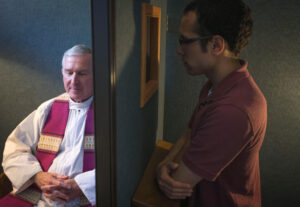As we approach end of the Advent season, the Sacrament of Confession takes on heightened significance within the Catholic Church. Advent, a period of anticipation and preparation for the celebration of the birth of Christ, serves as a unique and opportune time for believers to engage in the spiritual practice of confession.
The act of confessing one’s sins and seeking absolution becomes particularly poignant during this season, as it allows individuals to prepare their hearts and souls for the coming of Christ. The Sacrament of Confession, also known as reconciliation or penance, holds a central place in the Catholic Church’s spiritual practices. At the core of this sacrament lies the sacred and inviolable concept known as the sacramental seal. This article aims to explore the rules governing confession within the Catholic Church, with a particular focus on the significance and strictures surrounding the sacramental seal.
Scriptural Basis for the Sacrament:
The Sacrament of Confession:
Confession is one of the seven sacraments in the Catholic Church and is seen as a crucial means of spiritual healing and renewal. It involves the penitent confessing their sins to a priest, who, acting as a mediator, imparts absolution and offers guidance for spiritual growth. The process is designed to foster reconciliation between the penitent and God, as well as within the community of believers. Central to the sacrament of confession is the sacramental seal, a divine injunction that binds priests to absolute secrecy regarding the sins confessed to them. The Catechism of the Catholic Church emphasizes the sacred nature of this seal, stating that “the sacramental seal is inviolable” (CCC 1467). This means that priests are strictly forbidden from disclosing any information shared with them during the sacrament, under penalty of excommunication.

Historical Roots:
The tradition of the sacramental seal traces its roots to the early centuries of Christianity. The Fourth Lateran Council in 1215 first formally mandated the seal of confession, emphasizing the priest’s obligation to keep absolute silence about the sins confessed. This commitment was later reaffirmed and clarified by various Church councils and papal decrees throughout history.
Canonical Basis:
The Code of Canon Law further codifies the sacramental seal, highlighting its non-negotiable nature. Canon 983 states, “The sacramental seal is inviolable; therefore, it is absolutely forbidden for a confessor to betray in any way a penitent in words or in any manner and for any reason.” This canonical provision underscores the gravity of breaching the seal and underscores the Church’s commitment to upholding the sanctity of the confessional.
Past Challenges and Controversies:
Throughout history, the sacramental seal has faced challenges, particularly during times of political unrest or societal upheaval. Priests have often been subjected to persecution for refusing to disclose information obtained during confession. Despite such challenges, the Church has remained steadfast in its defense of the seal, viewing it as a fundamental safeguard for the integrity of the sacrament.The sacramental seal in the Catholic Church stands as a testament to the Church’s commitment to providing a safe and confidential space for individuals seeking spiritual healing and reconciliation. By upholding the inviolability of the confessional, the Church seeks to maintain trust in the sacrament of confession, ensuring that penitents can approach the sacrament with confidence, knowing that their sins will remain confidential and protected by the sacred seal.






